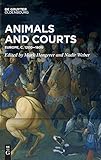Animals and Courts : Europe, c. 1200–1800 / ed. by Mark Hengerer, Nadir Weber.
Material type: TextPublisher: München ; Wien : De Gruyter Oldenbourg, [2019]Copyright date: ©2020Description: 1 online resource (VIII, 434 p.)Content type:
TextPublisher: München ; Wien : De Gruyter Oldenbourg, [2019]Copyright date: ©2020Description: 1 online resource (VIII, 434 p.)Content type: - 9783110542561
- 9783110542769
- 9783110544794
- 305.52209409 23
- D131 .A55 2020
- online - DeGruyter
| Item type | Current library | Call number | URL | Status | Notes | Barcode | |
|---|---|---|---|---|---|---|---|
 eBook
eBook
|
Biblioteca "Angelicum" Pont. Univ. S.Tommaso d'Aquino Nuvola online | online - DeGruyter (Browse shelf(Opens below)) | Online access | Not for loan (Accesso limitato) | Accesso per gli utenti autorizzati / Access for authorized users | (dgr)9783110544794 |
Frontmatter -- Table of Contents -- Introduction -- Meaningful Movements: Animal Circulation and Intercourt Relations -- Hunting with Cheetahs at European Courts: From the Origins to the End of a Fashion -- The Black Francolin: Assessing the Origins of a Prized Courtly Bird in an Interdisciplinary Manner -- Non-European Animals and the Construction of Royalty at the Renaissance Portuguese Court -- Animals as Agents of Networking and Cultural Transfer: The Dukes of Ferrara and their Relations to German Courts in the Sixteenth Century -- Formative Interactions: Horses, Dogs, and the Making of the Courtier -- On Courtly Discipline: Animal Rituals and Noble Self-fashioning in Gottfried von Strassburg’s Tristan -- Marketing Nobility: Horsemanship in Renaissance Italy -- Stable Design and Horse Management at the Italian Renaissance Court -- Horses, Bulls, and Cavaleiros at the Portuguese Court 1640–1800 -- Lively Representations: Animals, Rank, and Courtly Sociality -- Lively Representations: Animals, Rank, and Courtly Sociality -- Rubino, El Serpentino, Viola, and the Others: Renaissance Portraits of Dogs and Horses at the Court of the Gonzagas -- Staghounds and the Making of Excellence: Canine Knowledge and Royal Mastery in Sixteenth-Century France -- Royal Equipage on its Way: Carriages and Court Ceremonial in Eighteenth-Century Munich -- Unruly Display: The Challenges of Working with Animals in Swedish Royal Spectacle -- Coded Emotions: Animals, Love, and Gender Relations -- “God be with you, Sir Squirrel!” Pet Squirrels between Amorous Play and Animal Appetite, c. 1100–1650 -- A Woman’s Life: The Role of Pets in the Lives of Royal Women at the Courts of Europe from 1400–1800 -- “Triton as a friend”: A Dog’s Life at the Dessau Court, c. 1798–1811 -- Animal Deaths, Commemoration, and Afterlives at the Gonzaga Court and Beyond -- Epilogue -- Comment: Animals at Court: Interspecies Relations in a Longue Durée Perspective -- Indices -- Index of names -- Index of animals -- Index of places -- Index of concepts
restricted access online access with authorization star
http://purl.org/coar/access_right/c_16ec
Early modern princely courts were not only inhabited by humans, but also by a large number of animals. This coexistence of non-human living beings had crucial impacts on the spatial organization, the social composition and cultural life at these courts. The contributions enrich our knowledge on another aspect of court life and invite to reconsider our basic understandings of court, courtiers and court society.
Mode of access: Internet via World Wide Web.
In English.
Description based on online resource; title from PDF title page (publisher's Web site, viewed 21. Jun 2021)


